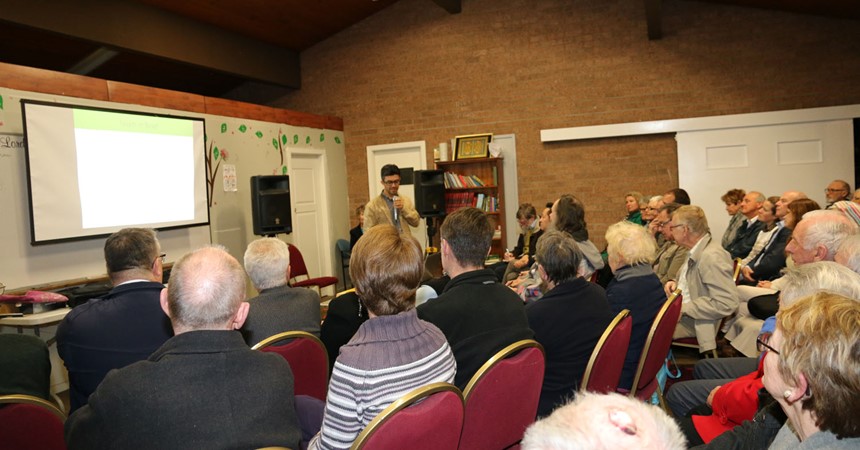The President of the Islamic Centre and part-time Imam, Forugh Dolani, introduced the basic concepts of the Muslim Faith with a slide presentation. “Islam is a submission to God’s will”, was the introductory sentence to a number of topics covered throughout the night.
The first topic was Islamic Belief. This belief is based on the following aspects: The unity of God, the existence of angels, the Holy Books and Inscriptions, Prophets of God, Divine determination and the Day of Resurrection.
The unity of God is the most essential aspect of Islam. “Like a book cannot exist without a writer, we believe this whole majestic universe cannot exist without a maker, a governor, a designer – That is the God almighty”.
Muslims, like Christians, believe in Angels and Archangels, and have Holy Books. In fact, the Quran recognises the revelation sent to Muhammad and Abraham, the Torah, the Psalms revealed to David and the Gospel of Jesus.
Prophets are important to the Islamic people. “The prophets are the messengers. The Quran talks about many prophets, however only 25 are mentioned by name, including Muhammad, but there are a lot more. Each prophet has different levels: Jesus, Abraham, Isaac, Moses and most importantly Muhammad are highly ranked prophets: they come with a message, a set of laws, a book and revelations.
Muslims also believe in resurrection. After death it is expected that each person comes back in body and soul and there will be a supreme tribunal in which they will be judged justly and mercifully.
Islamic Teaching was the second topic of the night. The teaching has 2 sources: The Quran - revealed to prophet Muhammad- which contents could be grouped in four topics: monotheism, prophethood, resurrection and justice. “It talks about what happened before us, what we need to do to deal with the current world and situation, in another word, our daily lives, and what going to come”.
The second teaching source is Muhammad’s words. Muslims call Muhammad “The walking Quran” because he lived and preached by example.
The third and last topic was Islamic Practice, based on five fundamental pillars: Testifying there’s a God and Muhammad is the messenger, the prescribed daily prayer (five times a day), charity, fasting in Ramadan and the duty of visiting the Mecca at least once in your lifetime.
Talking Sharia and Jihad
Forugh Dolani talked about Sharia law and its true meaning: “The path to be followed”.
“Sharia is set of divine laws stipulated for human beings for a fair and just existence on Earth. The laws are static but our understanding is dynamic. The laws include topics such as how to worship God, how to raise children, how to not cheat at work, how to treat neighbours, among others. Only 80 legal verses out of 6,236 talk about the Sharia laws. These laws empower human beings with self-governing with a strong emphasis on justice.”
When speaking about Jihad, Forugh Dolani said, “No, it does not mean Holy War. It fights superstitions, carnal desires and evil incarnations. It encourages us to follow the path of doing good like striving to do good deeds or free people from tyranny and oppression”.
Speaking about fundamentalism
The last 15 minutes of the night were dedicated to Q&A, where the audience had the chance to ask about certain Islamic concepts and specifically the religion’s connection to fundamentalism.
“The Quran says there are 2 different types of verses: some are changing verses, meaning these verses are subject to interpretation; but certain verses are fixed, for example, no Muslim is allowed to say that there are fewer than five times of prayer or no fasting.
There are certain things that we are allowed to interpret. For example, some people say the bowing for prayer should be in 90 degrees and some other say it should be 120 degrees. These are the things that bring different opinions about a certain law.
The Quran talks about history as well, and once upon a time, Muslim people weren’t allowed to react when they were humiliated. When they migrated to Medina and most people lost their wealth, prophet Muhammad was told to ask the people to retaliate; it was time to take their revenge. People resisted at first but eventually they were convinced to take action.
Fundamentalist people will take these historic verses, when God said to a person 1,400 years ago, to retaliate. Muhammad said, “Kill this people like they killed you”, so it’s only relevant to that point. The group of extremists, terrorists, took those verses out of context and are now killing innocent people.
The verses can be taken out of context, but it happens with people with no knowledge".
The last Interfaith Forum of 2017 will be based on the Salvation Army on Wednesday 22 November at the Salvation Army Church on 67 Cleary Street, Hamilton. If you would like to attend, please register with Brooke Robinson on brooke.robinson@mn.catholic.org.au or P 4979 1111.

